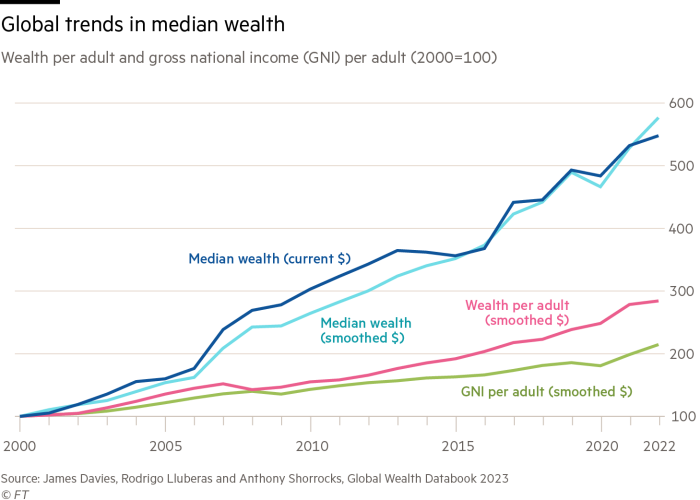
When private clients discuss their finances with wealth managers, there is one common concern at the forefront of their mind: geopolitical risk.
Ed Smith, co-chief investment officer at Rathbones, says the company’s annual survey of clients shows that the risk of disasters, from cyber attacks to military invasions, “keeps them up at night the most”.
It’s a worry shared by some of the wealthiest individuals around the world. According to a global survey by Swiss wealth manager UBS, family offices with an average net worth of $2.6bn are “most concerned about the danger of a major geopolitical conflict”.
However, “how do I protect my portfolio against international calamity?” is a tricky question for wealth managers to answer — apart, perhaps, from the most general advice: buy high-quality fixed income, gold and energy. Major geopolitical risks are notoriously difficult to predict.
Smith says his firm tries to help clients prepare by outlining various scenarios. “Every year, as a formal process, we assess what we think are the four most profound geopolitical risks and partner with strategists to monitor them.”
The firm’s sobering warnings comprise China invading Taiwan; the nuclear threat to eastern Europe; full-scale war between Iran and Israel; and a systemic cyber attack.
But when it comes to the risks — and opportunities — identified by their clients, what do wealth managers say?
FT Money spoke to firms across the UK about the most commonly asked questions from clients. These are the other four topics that are coming up in conversation most frequently:

Does the FTSE have a future?
The debate around the relative cheapness of UK equities and whether private investors should snap them up still divides opinion.
“There seems to be some renewed interest among some of our clients . . . but there are others who are convinced UK equities are going the way of the dodo,” says Smith.
What is inescapable is that the UK equity market, once a stalwart of global stocks, is much diminished, both in terms of value and the number of listed companies. The decline has been exacerbated over the past couple of decades by a shift among defined benefit pensions out of equities and into bonds to meet their liabilities — payouts to retirees. This stemmed from an accounting change in 2000, which pushed many companies, suddenly on the hook for any deficits, into strategies based on long-term government bonds.
As a result, the UK stock market’s weighting in the MSCI World index has fallen from 10 per cent to 4 per cent over the past 15 years.
Wealth management survey
See the results of Savanta’s 2024 survey for FT Money. Download the tables here (pdf)
Many wealth managers have therefore cut their customers’ exposure. According to AJ Bell, an investment platform, the average balanced fund in 2009 held 55 per cent of its equities in the UK. This has fallen to 25 per cent. In contrast, US stocks have risen from 12 per cent to 39 per cent.
St James’s Place, the UK’s largest wealth manager for individuals using advisers, has also steadily taken the knife to UK stocks on behalf of clients. Figures show about 9 per cent of funds under management sit in UK equities compared with 21 per cent in 2018 and 30 per cent a decade ago. At the same time, its exposure to global stocks has increased.
Other large wealth managers have taken a similar stance. “We’ve been consistently reducing our UK weighting for many years,” says Caspar Rock, chief investment officer of Cazenove Capital. “People are taking a more global outlook.”
However, he noted that the mood has started to change towards UK equities. “There are some very cheap opportunities. Merger and acquisition prices show they’re undervalued,” he adds.
According to a recent survey by Rathbones, 81 per cent of wealth managers and financial planners expect growth in large and mid-cap UK stocks over the next 12 months because of their attractive valuations and the improving domestic economic outlook. Some 70 per cent believe UK equity valuations will rise versus their US counterparts.
Edward Park, chief asset management officer at Evelyn Partners, says the UK “is now significantly cheaper than the US and continental European peers,” and notes that there is a “strong valuation argument” to own some UK stocks.
“We believe in making the most of a global opportunity set,” says Smith. “But investment flows are coming back to the UK — we are seeing a turning point. ”
Do I need a wealth manager if I’m passive investing?
Wealth managers are increasingly turning to low-cost index trackers when investing their clients’ money.
Even firms that have long-backed star active fund managers are now broadening their offering to include passive investments.
St James’s Place, for example, has increased its use of passives in its Polaris multi-asset range. “The wealth management industry as a whole is embracing and embedding more lower cost investments than ever before and this inevitably will continue as the universe of index funds . . . rapidly expands,” says Justin Onuekwusi, chief investment officer at St James’s Place.
Hargreaves Lansdown, the largest DIY investment platform in the UK, which has championed actively managed funds over the years, has launched a range of multi-asset funds that invest in passive trackers.

But some consumer champions note investors should be wary of paying high fees to a wealth manager that picks tracker funds, which simply mirror the stock market. “If you’re comfortable using tracker-based funds, you may as well do it yourself and save the additional costs,” says Andrew Hagger, founder of consumer finance site MoneyComms.
One of the benefits of index trackers are the cheap fees, which can be less than 0.1 per cent a year, compared with active funds, which tend to charge more than 0.5 per cent.
Wealth managers argue that they are not at risk. “Passives are not a threat to wealth managers, they are absolutely an opportunity,” says James McManus, chief investment officer of Nutmeg, which invests solely through index trackers. He says that index trackers are “the best way to execute” broad investment decisions “at the lowest possible cost”.
Although active managers are suffering from withdrawals as customers head for cheaper passives, stockpickers still have a role to play. According to the UBS survey, almost four in 10 family offices globally state that they currently rely more on manager selection and active management to diversify their portfolios.
“Amid rapid technological change, shifting rate expectations and uneven growth, the increased dispersion of returns offers opportunities for active management,” says Maximilian Kunkel of UBS Global Wealth Management. “As a result, interest in active management seems to be increasing again.”
Wealth managers note that investors are interested in actively run funds and discretionary portfolios focused on sustainable or ESG stocks.
Frédéric Rochat, managing partner at Lombard Odier Group, says “the next generation” in particular are “often fully committed to the environmental transition and want to reflect their long-term convictions in their portfolios with the same consistency.”
How will elections affect my money?
The surprise announcement in June of a French election sent stocks in the Cac 40 index down 6 per cent over the following five days, marking its worst weekly performance in more than two years.
With the UK heading to the polls next week, concerns centre around what tax changes a Labour government might bring in if elected. “Lots of clients are worried there’ll be changes to capital gains tax,” says Poppy Fox, an investment manager at Quilter Cheviot.
Labour — which is widely predicted to win a majority — has said it has “no plans” to raise CGT.
But Nick Ritchie, senior director of wealth planning at RBC Wealth Management, says this has not been enough to stop phone calls from concerned wealthy clients. “A lot of people have picked up on the silence on CGT,” he says. “A lack of detail makes individuals nervous.”
Charlene Young, pensions and savings expert at AJ Bell, says that more investors have sold assets to put them in a tax shelter over the past couple of years, in what is referred to as a “Bed and Isa” transaction. “The CGT allowance is ‘use it or lose it’ and lots of investors have been prompted to use the CGT allowance while it remained more generous.”
The tax-free allowance has shrunk over the past two years from £12,300 to £3,000. “We’ve had conversations prior to the election about CGT as allowances have gone down significantly over the past couple of years,” says Fox at Quilter Cheviot. “CGT is unlikely to get more favourable.”
Will you be under new management in five years?
As mergers and acquisitions pick up in the UK market, wealth managers have become ripe targets. This is in part because, as mentioned above, London-listed companies are inexpensive but also because of the longer-term growth prospects in the industry associated with an ageing population. Hargreaves Lansdown, for example, received a takeover offer in June from private equity firms, valuing the company at £5.4bn.
There has already been a degree of consolidation in recent years, including Rathbones’ acquisition of Investec Wealth & Investment UK, and Royal Bank of Canada’s deal to buy Brewin Dolphin. Evelyn Partners was formed from Tilney’s acquisition of Smith & Williamson, Bestinvest and Towry over the years.
“Consolidation has got a long way to go,” says Rock at Cazenove. “There will be consolidation because of the cost of technology and regulation.” One of the main regulation changes of late has been the Financial Conduct Authority’s Consumer Duty rules. The regulation, which came into force last July to help consumers receive a fair deal, has significantly added to wealth managers’ workloads.
The shrinking of the industry is not without problems for customers, who are left with fewer wealth managers.
“It’s becoming clear that scale matters,” says Smith at Rathbones, adding that the benefits range from dealing more efficiently with the regulatory burden to accessing parts of the market at the best prices.
“But of course, there are downsides to scale — the liquidity constraint for certain parts of the market.” As wealth managers grow in size, it becomes more difficult to put clients’ money in certain funds, as they represent a larger proportion. This increases the risk that it becomes hard to sell out.
Just as they grapple with political risks and macroeconomic events, wealth managers are bracing for further consolidation. The next few years may prove to be pivotal in securing their future.